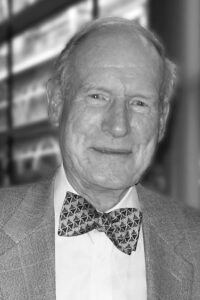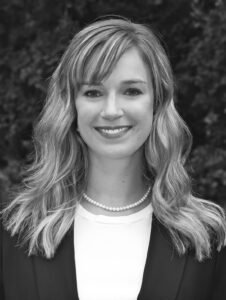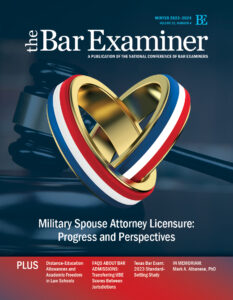This article originally appeared in The Bar Examiner print edition, March 2015 (Vol. 84, No. 1), pp 60–64.
By Fred P. Parker III and Jessica GladABA-Approved Law Schools
Attorney from non-ABA-approved law school
In the Matter of Odegua J. Irivbogbe, Applicant to the West Virginia Board of Law Examiners, 2014 WL 2404312 (WV)
Odegua Irivbogbe graduated from the University of Lagos in Nigeria, passed the New York bar exam in 2007, and was admitted to the New York Bar in 2008. She never practiced in New York. She moved to West Virginia and filed an application in July 2012 with the West Virginia Board seeking admission by examination under the Board’s Rule 3.0. The Board denied the application based on Irivbogbe’s failure to meet the educational requirements of Rules 2.0 and 3.0. The Board found that Rule 3.0(b)(4) requires that a graduate of a foreign law school where the common law of England exists as the basis for its jurisprudence must successfully complete 30 basic credit hours at an ABA-approved law school in order to sit for the West Virginia bar exam, and Irivbogbe had not completed these credits.
Irivbogbe then requested an administrative hearing, which was held in February 2013. The hearing examiner concluded that the Board’s decision must be affirmed. The Board reviewed this report in June 2013 and voted to deny Irivbogbe’s application based on her failure to meet the educational requirements in Rules 2.0 and 3.0 because the Rules do not allow the Board any discretion to waive or modify these requirements.
The matter was appealed to the West Virginia Supreme Court. The Court reviewed the record de novo with regard to questions of law, the application of the law to the facts, and whether the applicant should or should not be admitted to the practice of law in West Virginia.
Irivbogbe argued that her legal education and the study materials she had used in preparing for the New York bar exam were equivalent to an education received at an ABA-approved law school and that she should be allowed to sit for the West Virginia bar exam. She further asserted that the Board had misapplied rule 3.0(b)(4) and that she should be allowed to sit pursuant to Rule 3.0(b)(1), which applies to graduates of non-ABA-approved law schools who have passed the bar exam in another state and have been admitted in that state. This argument had been rejected by the Board because that rule applies only to graduates of U.S. law schools.
The Court stated that the main issue on appeal was whether the Board had correctly concluded that Rule 3.0(b)(4) applies to all foreign law school graduates. The Court agreed with the Board that all foreign-educated applicants must successfully complete a minimum of 30 credit hours of basic courses selected from certain listed areas of law. Since Irivbogbe had not done this, she was not currently eligible for admission to practice in West Virginia by examination.
Irivbogbe also argued that a denial would violate her right to equal protection. The Board had found that Irivbogbe was not similarly situated to applicants who were educated at ABA-approved law schools. The Court agreed and affirmed the Board’s decision.
Attorney Discipline
Unauthorized practice of law
In re Seth Cortigene and Newton B. Schwartz, Sr., 144 So. 3d 915 (LA 2014)
In a matter of first impression, the Supreme Court of Louisiana considered whether it has the authority to impose discipline on a lawyer not admitted to the bar of Louisiana.
This case arose from consolidated disciplinary proceedings resulting from formal charges filed by the Office of Disciplinary Counsel (“ODC”) against attorneys Seth Cortigene and Newton B. Schwartz, Sr. Cortigene was licensed to practice law in Texas and Louisiana but was currently ineligible to practice due to his failure to comply with his professional obligations. Schwartz was licensed to practice law in Texas and Pennsylvania, but was not licensed in Louisiana. The ODC charged Schwartz with engaging in the unauthorized practice of law by appearing at and participating in a Louisiana deposition. The ODC charged Cortigene with facilitating Schwartz’s misconduct and failing to report it to disciplinary authorities. The matter proceeded to a hearing on the formal charges filed against both attorneys.
The hearing committee concluded that both attorneys had violated the Rules of Professional Conduct as charged. It recommended that Cortigene be disbarred. However, because Schwartz was not admitted to the Louisiana bar, the hearing committee declined to recommend disbarment for him, and instead recommended that Schwartz be publicly reprimanded and permanently enjoined from the practice of law in the state.
The disciplinary board adopted the hearing committee’s factual findings, its legal conclusions, and most of its sanctions recommendations. It agreed that disbarment would be the appropriate sanction for Schwartz’s misconduct, but reasoned that disbarment was inapplicable to an attorney not admitted to the Louisiana bar. Instead, the board concluded that the only sanction applicable to a non-Louisiana attorney would be a public reprimand. The ODC appealed to the Supreme Court of Louisiana, asserting that the board had erred in concluding that Schwartz could not be disbarred in Louisiana.
The Court conducted an independent review of the record to determine whether the alleged misconduct was proven by clear and convincing evidence. Based on its review, the Court concluded that Schwartz had engaged in the unauthorized practice of law. It also found that Cortigene had facilitated Schwartz’s unauthorized practice and failed to report it to disciplinary authorities. The Court disbarred Cortigene, but concluded that the appropriate sanction for Schwartz’s conduct if he were a member of the state bar would be a three-year suspension.
The Court then answered in the affirmative what it considered to be a res nova issue, that is, whether it has the authority to impose discipline on a lawyer not admitted to the bar of Louisiana. Pursuant to its plenary power to define and regulate all facets of the practice of law, the Court explained, “we have the right to fashion and impose any sanction which we find is necessary and appropriate to regulate the practice of law and protect the citizens of this state. This power is broad enough to encompass persons not admitted to the bar who attempt to practice law in this state.” Therefore, the Court concluded, “in the exercise of our plenary authority, we may enjoin a non-Louisiana lawyer from seeking the benefits of a full or limited admission to practice in this state.”
Accordingly, the Court adjudged Schwartz guilty of conduct that would warrant a three-year suspension if he were a member of the Louisiana bar. However, recognizing that he was not a member of the state bar, the Court enjoined Schwartz for a period of three years from seeking admission to practice law in Louisiana on either a permanent or temporary basis.
Character and Fitness
Financial irresponsibility
In the Matter of the Application of T. Z.-A. O. for Admission to the Bar of Maryland, 441 Md. 65, 105 A.3d 492 (MD 2014)
In May 2012, T. Z.-A. O. (“Applicant”) filed an application for admission to the Maryland Bar with the State Board of Law Examiners, and in June 2012 the Board sent the application to the Character Committee for the Fifth Appellate Circuit (“the Committee”). Applicant passed the July 2012 Maryland bar exam; however, based on the results of the Committee’s investigation, in June 2013 a three-member panel of the Committee held a hearing to determine whether Applicant possessed the good moral character and fitness necessary for admission to the Maryland Bar. The panel found the following facts:
- In May 1996, Applicant was arrested for public indecency in Columbus, Ohio. He pled guilty in July 1996 and was sentenced to 30 days in jail with 1 day credited toward the sentence and the other 29 days suspended.
- In 2004 Applicant applied to and was accepted at Tulane Law School. Question 28 on the law school application asked about criminal charges and convictions. Applicant answered in the negative and certified that his answers were true.
- Applicant disclosed the 1996 arrest and conviction when he applied to the Florida Bar, and the Florida Board discovered that Applicant had failed to disclose the 1996 matters to Tulane and contacted Applicant, who then notified Tulane about his failure to disclose.
- In May 2004, shortly after applying to law school, Applicant filed a petition for Chapter 7 bankruptcy and at the hearing admitted that his financial activities had been irresponsible and included the use of multiple credit cards when he was unemployed with no means to pay the balances. In August 2004 $58,000 in debt was discharged.
- In August 2006, Applicant purchased a new Honda vehicle. Applicant stated that he had been planning to purchase a used car, but that the sales personnel persuaded him to test-drive new vehicles and prepared the car loan application as well as additional contracts and agreements related to the car purchase. The loan application did not mention the 2004 bankruptcy and falsely stated that Applicant owned a home, made no rental or mortgage payments, and earned $3,500 a month. Applicant certified that all the information on the application was true, correct, and complete. Applicant later claimed that the sales representative must have inserted the false information about home ownership and income into the car loan application. Applicant knew that the interest rate was 14.95% and that his monthly payments would be $674.70 when he took possession of the vehicle.
- In fall 2007, Applicant stopped making monthly car payments because he claimed that the contract contained irregularities; however, he continued using the car and did not turn it in until February 2008. At that time there was a $19,000 arrearage on the car loan. Applicant testified that he litigated against the finance company and the company forgave the outstanding arrearage.
- At the time of the hearing, Applicant was self-employed and performed research and writing for a law firm in Florida. In 2012 Applicant had earned $24,000, and from January to June 2013 he had earned between $18,000 and $19,000. Applicant admitted that he had $220,000 in private and federal student loan debt, that he was making only minimum payments on the private loans, and that the federal loans were in forbearance or deferred.
The Committee concluded that Applicant had not shown financial responsibility. He had continued to accumulate debt with no plans to repay it. Since his bankruptcy, in which he had discharged $58,000 in debt, he had accumulated nearly $200,000 in student and consumer loans and had discharged the $19,000 vehicle loan. He also had not acknowledged the untruthful information on his loan application, and he had stated that his application to the Florida Bar was denied because of illegal behavior and financial irresponsibility. The Committee recommended that Applicant’s application be denied.
In December 2013, the Board conducted a hearing and at its conclusion recommended that Applicant be denied admission to the Maryland Bar, finding that after his bankruptcy he had established numerous consumer credit accounts and that he had not taken his credit obligations seriously until it appeared that they might keep him from being admitted in Maryland. Applicant was 31 years old and a college graduate when he entered law school, was 32 and a law student when he signed the car loan papers, was 33 when he applied to be admitted in Florida, and was 38 when his Maryland application was accepted. He seemed to treat these incidents of financial irresponsibility as youthful indiscretions. The Board found that “[h]e [had] shown no commitment to honesty and financial responsibility.”
The matter was then reconsidered by the Court of Appeals of Maryland, which under the Court’s rules is “charged with the responsibility to conduct an independent evaluation of the applicant’s moral character based upon testimony and evidence submitted before the Committee and the Board.” The Court noted that in bar admission cases failure to honor financial obligations and lack of candor are serious matters that do not reflect well upon an applicant’s fitness to practice law, adding that absolute candor is a requisite of admission in Maryland.
The Court again concluded that Applicant’s “inability to honor financial obligations and to be financially responsible, as well as (his) lack of candor, reflect that he does not presently possess the moral character and fitness necessary to practice law” in Maryland. The Court stated that Applicant’s character and fitness to practice were shown to be questionable by his lack of candor in connection with the 2006 car loan application containing false financial information. The Court added that rather than accepting full responsibility for this, he blamed the car sales representative. Stating that both the Committee and the Board had recommended denial of admission, the Court again agreed, concluded that Applicant had failed to meet the burden of proof, and denied his application for admission to the Maryland Bar. The Court also denied Applicant’s Motion for Reconsideration of the Court’s April 2014 denial of Applicant’s application.
 Fred P. Parker III is Executive Director Emeritus of the Board of Law Examiners of the State of North Carolina.
Fred P. Parker III is Executive Director Emeritus of the Board of Law Examiners of the State of North Carolina.

Jessica Glad is Staff Attorney for the National Conference of Bar Examiners.
Contact us to request a pdf file of the original article as it appeared in the print edition.
[apss_share]






